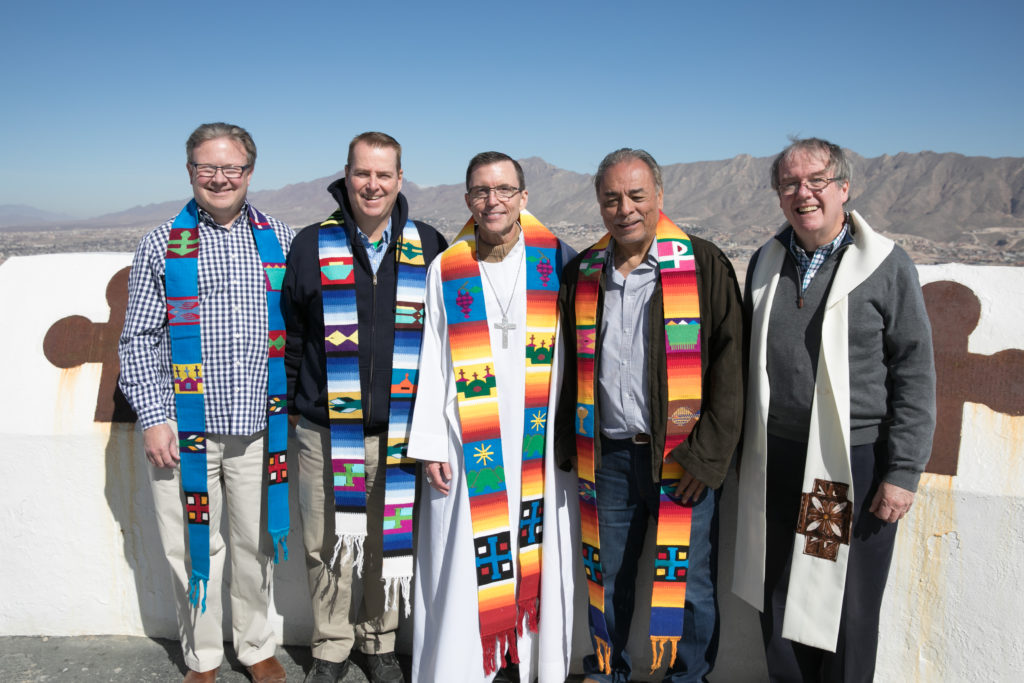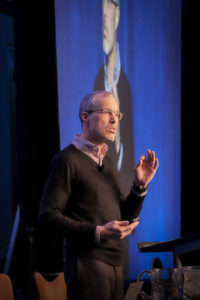Through this national initiative, grants have been made to 78 organizations to help clergy support one another in the pursuit of excellence in their congregational ministries.
When the Rev. Joe Tito crisscrossed the border between McAllen, Texas, and Reynosa, Mexico, in July, he saw firsthand the drama that his immigrant parishioners had so often described to him. “I’d heard their stories and knew the dangers,” says Tito, pastor of the bilingual St. Nicholas Catholic Church in Evanston, Ill. “But in my 23 years of Hispanic ministry, I had never been to the border. I wanted to see it for myself.”
What he witnessed was both sobering and inspiring. As part of a small delegation of Chicago-based priests, Tito traveled south to spend three days touring shelters managed by nuns, talking with families awaiting asylum, and interacting with parish volunteers who provided migrants with everything from haircuts to food to medical care. The needs were overwhelming, but so was the hospitality of the local faith community. “We came away feeling very proud of the work the church is doing,” he says.
An added benefit of the trip was the camaraderie that developed among the priests from a variety of parishes not currently in ministry together. Each morning they piled into a small van to visit outposts on both sides of the border. Each evening they gathered for dinner to reflect on all they had seen. “Blame it on busy schedules and heavy workloads, but sometimes we don’t know what’s happening a mile away, let alone a thousand miles away,” says Joe Boland, vice president of mission for the Catholic Extension, the trip’s sponsoring organization. “One of the great blessings of this program is that the priests experience something formative, and they do it together.”

Immersion experience in Sunland Park, New Mexico
Boland has overseen seven similar trips and more are in the pipeline. He also has hosted five reunion gatherings to keep the program’s alumni in touch and to deepen the friendships that began on the road. “Pastors crave relationships with peers,” he says. “These experiences help them broaden their horizons pastorally, theologically and spiritually.”
Peer power
Catholic Extension is one of 78 faith-based organizations participating in the Endowment’s national Thriving in Ministry initiative, launched in January. Its purpose is to support new and existing projects that enable pastors to step away from daily ministry and form small peer communities whose members kick back, learn, worship and grow together. Each program is unique, depending on its participants. Some reach out to pastors new to ministry; others engage mid-career clergy; and still others focus on pastors in the midst of personal or professional transitions. Most programs include mentoring opportunities, and all share an over-arching goal of helping clergy thrive as leaders of their congregations.
“The role of the pastor is more challenging today than ever,” says Matt Bloom, director of the Endowment-supported Flourishing in Ministry project based at the University of Notre Dame.

Matt Bloom
Bloom’s research, now in its third phase, has identified conditions that enhance the well-being of pastors and obstacles that impede it. A key conclusion has been that feelings of isolation, caused by a lack of social connections, can have serious consequences. It can lead to what Bloom calls “a downward spiral of well-being and ministry effectiveness.” This debilitating process often is slow, with the pastor’s choosing to ignore early signs of tension, fatigue and burnout. “By the time congregations recognize that their pastors are suffering, it’s usually past the point of easy recovery,” says Bloom.
His research findings have informed the designs of many of the Thriving in Ministry programs. Grantees have built into their plans the three steps that Bloom says can help halt and even reverse the downward spiral. He encourages clergy to step back and recognize the sources of stress in their lives; take steps toward easing or eliminating the stress; and embark on those steps in the company of peers who may be experiencing similar stress.
Retreat to the bunker
“I’ve absorbed everything I could get my hands on that Matt Bloom has written,” says Mike Cope, director of ministry outreach at Pepperdine University and overseer of the school’s Thriving in Ministry program. The name of the Pepperdine project—“Sanctuary”—hints at its intent, as does the nickname that participants have given their private Facebook page. “We call it the ‘Bunker’ because it’s a place where pastors can get away from the shrapnel of ministry for a while,” explains Cope. “It’s a safe place where we can be honest, retool and help each other grow.”
Before creating Sanctuary, Cope met with pastors and asked them to talk about their challenges and how a program could address them. Responses confirmed the need for a support community, adequate time for contemplation, and help with achieving a healthy lifestyle. “Pastors can get so stuck in the busyness of ministry that their personal growth is stunted,” says Cope. As a result of the conversations, the year-long program that emerged is a blend of structured learning opportunities and unstructured discussions. A high point is a getaway weekend for the pastors and their spouses at a retreat center.
For all the planning that goes into a successful program, “some of the best times are the unscripted moments,” says Jacob Parnell, pastor at Tri-Valley Church of Christ in Livermore, Calif., and a Sanctuary participant. He describes the getaway weekend as “an excellent environment for feasting and fellowshipping.” On a more serious note, he recalls the afternoon when a guest speaker failed to arrive, “and so we used the time to check in with some of the guys who were going through some stressful seasons in their ministry. We listened, commiserated and prayed.” Then, just for fun, they all crammed onto a conference table and posed for a group selfie. “It was a whimsical moment of camaraderie and support.”
Although Sanctuary didn’t include a formal mentoring component, friendships developed organically and continued after group members concluded their year together. They still stop by the Bunker to post random thoughts, “and three of us preached the same sermon texts during Advent,” says Parnell. “That project kept us connected via video conference throughout the month of December.”
Women to women
At least two Thriving in Ministry programs, both geared to female pastors, focus on self-care and mentoring. The RISE Together Mentorship Network, based at Union Theological Seminary in New York, reaches out to women of color in seven U.S. cities. Cohorts of 10 to 12 members meet monthly for three-hour sessions that follow a curriculum created by the project’s leader, Lisa Diane Rhodes. The goal of the program is expressed in the RISE acronym: Renew, Inspire, Support and Empower. Each gathering begins with an informal “check-in” time with mentees and mentors sharing thoughts, feelings and experiences from the past month. An educational module follows that might focus on leadership development, financial literacy or sermon delivery. All activities are geared to recognizing, celebrating and strengthening the talents of participants.

Union Theological Seminary
“Whereas Caucasian women in ministry struggle with issues of gender,” says Rhodes, “women of color in ministry struggle with issues of race and gender. They need safe spaces where they can gather in a learning and peer community to share their stories and receive guidance and validation about what it means to be clergy women of color.”
Although the network is new, it has earned early praise from participants. With support from the program, seven cohort members attended a preaching workshop this year where the women, all millennials, delivered sermons in front of an audience of peers and seasoned pastors. “The women were phenomenal,” says Rhodes. The positive feedback they received “gave them the confidence and affirmation they need to grow in ministry and recommit to their churches, communities, congregations and calls from God.”
Sisters to sisters
Unlike RISE, a second Endowment-funded program that reaches out to female pastors, has been around for several years and has 68 active alumnae. Women Touched by Grace (WTBG), a ministry at Our Lady of Grace Monastery in Beech Grove, a small city near Indianapolis, welcomed its first cohort of Protestant pastors more than a decade ago. The 2018-20 cohort is the fourth to benefit from the hospitality of the monastery’s resident Sisters of St. Benedict. Twice a year members of the cohort gather for 10 days of rest, reflection and exploration aimed at sparking new enthusiasm for ministry.
“Although they don’t know each other, they bond instantly.” says Sister Mary Luke Jones, WTBG project director. “They come to room 205 on the first evening for wine and cheese, and the chatter is amazing. They’re truly kindred souls.”
Building on WTBG’s past success, two offshoot programs are in the works as part of the Thriving in Ministry initiative. “A Multitude of Mentors” will train veteran pastors, many of them WTBG alumnae, in effective mentoring techniques. Jones envisions creating a clearinghouse for clergy who are looking for mentors. A second program gets under way in July 2019 when female clergy who are experiencing transitions gather at the monastery to learn how to move through change gracefully. “We call it ‘Grace-filled Turnings’ because it’s like turning the pages of your life,” says Jones. The women will hear an overview presentation and then divide into two groups. “One will focus on women transitioning to new ministries; the second will be for women transitioning into retirement or closing out a phase of their lives.”
Unfinished business
The Thriving in Ministry initiative and Matt Bloom’s Flourishing in Ministry research complement each other and continue the Endowment’s efforts to strengthen pastoral leadership. A $1.85 million grant to the University of Notre Dame in 2018 will support a longitudinal study to learn how pastors’ levels of well-being change over time. It also will focus on the challenges that certain groups encounter as they engage in ministry. Of particular interest are clergy who serve communities of color, part-time pastors and female pastors. Early findings confirm that while some challenges are universal. Others are more prevalent within certain demographics. As an example, “We think women face unique struggles in part because they serve in contexts that seem to prefer males as pastors,” says Bloom. “We want to understand the variety of challenges they experience and how they manage them.”
Technology will help accomplish the study’s goals. A new digital tool enables pastors to track their personal levels of well-being and access practices that boost those levels. Self-care is key, and researchers rely on a familiar scenario to illustrate its importance. They remind pastors to recall the advice flight attendants give airline passengers about the use of oxygen masks during emergencies: First, secure your own mask, then assist persons around you who need help. “It’s a marvelous metaphor,” says Bloom, making the connection to congregational ministry. “If you don’t first take care of yourself, eventually you won’t be able to take care of those people you’re called to serve.”